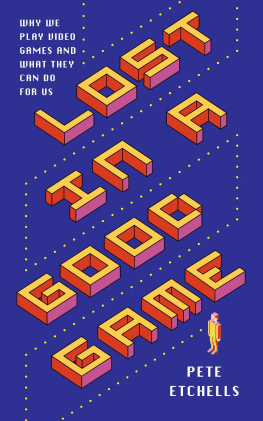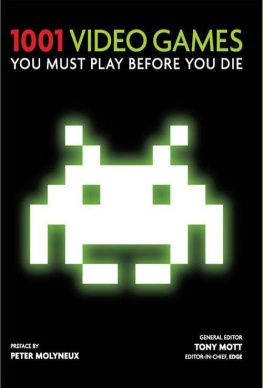The Art of Failure
Playful Thinking
Jesper Juul, Geoffrey Long, and William Uricchio, editors
The Art of Failure: An Essay on the Pain of Playing Video Games, Jesper Juul, 2013
The Art of Failure
An Essay on the Pain of Playing Video Games
Jesper Juul
The MIT Press
Cambridge, Massachusetts
London, England
2013 Massachusetts Institute of Technology
All rights reserved. No part of this book may be reproduced in any form by any electronic or mechanical means (including photocopying, recording, or information storage and retrieval) without permission in writing from the publisher.
Library of Congress Cataloging-in-Publication Data
Juul, Jesper, 1970
The art of failure : an essay on the pain of playing video games /Jesper Juul.
p. cm.(Playful thinking)
Includes bibliographical references and index.
ISBN 978-0-262-01905-7 (hardcover : alk. paper)
ISBN 978-0-262-31313-1 (retail e-book)
1. Video gamesPsychological aspects. 2. Video gamesPhilosophy. 3. Failure (Psychology) I. Title.
GV1469.3.J87 2013
794.8dc23
2012026836
10 9 8 7 6 5 4 3 2 1
To Otto, for teaching me how to play.
Series Foreword
Many people (we series editors included) find video games exhilarating, but it can be just as interesting to ponder why that is so. What do video games do? What can they be used for? How do they work? How do they relate to the rest of the world? Why is play both so important and so powerful?
Playful Thinking is a series of short, readable, and argumentative books that share some playfulness and excitement with the games that they are about. Each book in the series is small enough to fit in a backpack or coat pocket, and combines depth with readability for any reader interested in playing more thoughtfully or thinking more playfully. This includes, but is by no means limited to, academics, game makers, and curious players.
So, we are casting our net wide. Each book in our series provides a blend of new insights and interesting arguments with overviews of knowledge from game studies and other areas. You will see this reflected not just in the range of titles in our series, but in the range of authors creating them. Our basic assumption is simple: video games are such a flourishing medium that any new perspective on them is likely to show us something unseen or forgotten, including those from such unconventional voices as artists, philosophers, or specialists in other industries or fields of study. These books will be bridge-builders, cross-pollinating both areas with new knowledge and new ways of thinking.
At its heart, this is what Playful Thinking is all about: new ways of thinking about games, and new ways of using games to think about the rest of the world.
Preface
To begin with a confession: I am a sore loser. Something in me that demands that I win, beat, or complete every game I try, and that part of me is outraged and tormented whenever I fail to do so. Still, I play video games though I know I will fail, at least part of the time. On a higher level, I think I enjoy playing video games, but why does this enjoyment contain at its core something that I most certainly do not enjoy?
This book could not have been written without the help of friends and colleagues who challenged my arguments, fixed my mistakes, and offered me new ideas. My gratitude goes to those who commented on the manuscript as it evolved: Susana Tosca, Miguel Sicart, Markus Montola, Katherine Isbister, Ben Abraham, Jonathan Frome, Marie-Laure Ryan, Clara Fernndez-Vara, Jan-Nol Thon, Chaim Gingold, and Bennett Foddy. To those who provided comments and ideas for the arguments as they developed: Albert Dang, Kan Yang Li, Frank Lantz, Eric Zimmerman, Nick Fortugno, Jason Begy, T. L. Taylor, Jonas Heide Smith, Chris Bateman, Matthew Weise, McKenzie Wark, Svend Juul, and the MIT Press reviewers. Needless to say, any remaining failures of this book are entirely my responsibility.
Thanks to Rachel Morris for illustrations and Charles Pratt for a super screenshot. Thanks to Geoffrey Long and William Uricchio, coeditors of the Playful Thinking series, as well as Doug Sery and the rest of the MIT Press for supporting the project.
The Art of Failure was made possible by a grant from the Danish Centre for Design Research and written during a stay at the Danish Design School in Copenhagen.
I would like to thank Troels Degn Johansson and the rest of the Danish Design School for giving me the opportunity to write, and to Parsons the New School of Design, the Singapore-MIT GAMBIT Game Lab, and the New York University Game Center, where many of the ideas that went into the manuscript were hatched. Also thanks to the speakers and participants at the Unfortunate Game Events seminar in Copenhagen.
Thanks to Nanna Debois Buhl.
Parts of chapter 5 were cowritten with Albert Dang and Kan Yang Li, and published as The Suicide Game, in Proceedings of the 2007 DiGRA Conference, Tokyo, Japan.
Chapters 13 contain components of the article Fear of Failing? The Many Meanings of Difficulty in Video Games, in The Video Game Theory Reader 2, ed. Bernard Perron and Mark J. P. Wolf (New York: Routledge, 2008).
The book uses material from the presentation Beyond Balancing: Using Five Elements of Failure Design to Enhance Player Experiences, presented at the Game Developers Conference, San Francisco, 2009.
Elements of chapter 3 were originally published as In Search of Lost Time, in Proceedings of the Fifth International Conference on the Foundations of Digital GamesFDG 10, Monterey, California, 2010.
Additional material can be found on the books Web site: http://www.jesperjuul.net/artoffailure
1 Introduction: The Paradox of Failure
I was playing Patapon shown in figure 1.1. Things were going well, but when I came to the desert, my tactics began to fail. I repeated the trusted sequence of button pushes, but my warriors continued to burn to death in the sun; I failed the level; I tried again. I could not glean from the game if my timing was off, if I was using the wrong sequence, or if something completely different was wrong. I put the game away; I returned to it; I put it away again. I did not feel too good about myself. I dislike failing, sometimes to the extent that I will refuse to play, but mostly I will return, submitting myself to series of unhappy failures, once again seeking out a feeling that I deeply dread.
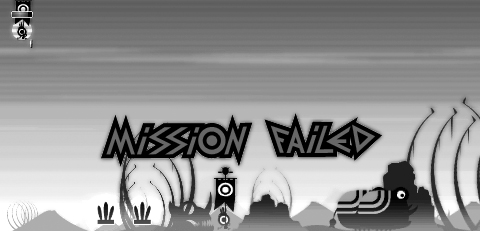
Figure 1.1
Patapon (Japan Studios 2008)
It is with some trepidation that I admit to my failures in Patapon, but I can fortunately share a story that puts my skills in a better light. I had been looking forward to Meteos In a feat of gamesmanship (I believe), I played the game to completion on my very first attempt without failing even once. Naturally, this made me very angry. I put the game away, not touching it again for more than a year. (I have not been able to repeat this first performance.)
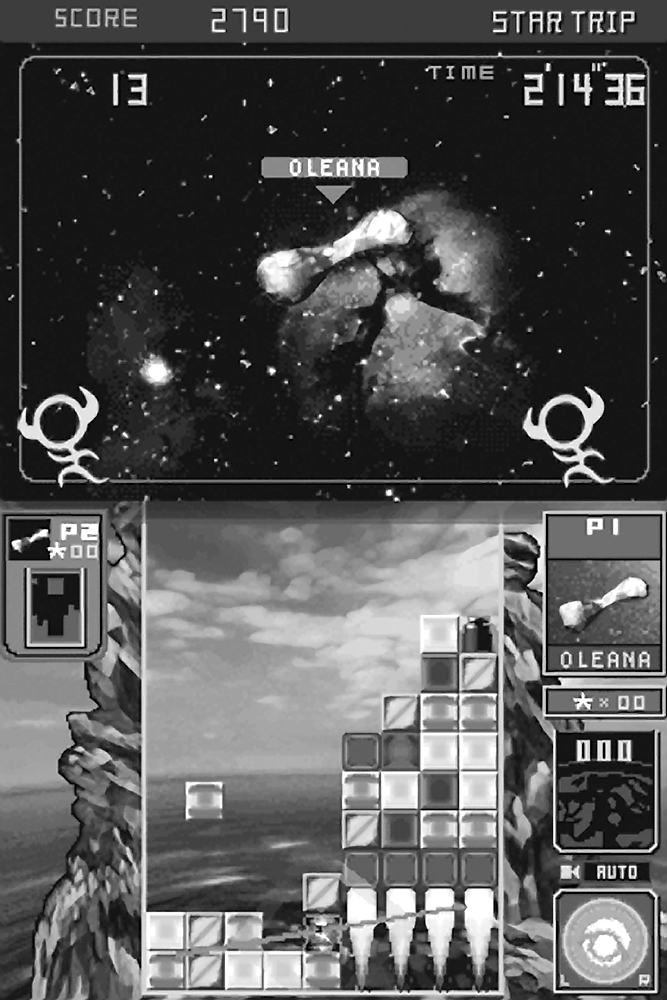
Figure 1.2
Meteos (Q Entertainment 2005)
I dislike failing in games, but I dislike not failing even more. There are numerous ways to explain this contradiction, and I will discuss many of them in this book. But let us first consider the strangeness of the situation: every day, hundreds of millions of people around the world play video games, and most of them will experience failure while playing. It is safe to say that humans have a fundamental desire to succeed and feel competent, but game players have chosen to engage in an activity in which they are almost certain to fail and feel incompetent, at least some of the time. In fact, we know that players prefer games in which they fail. This is the

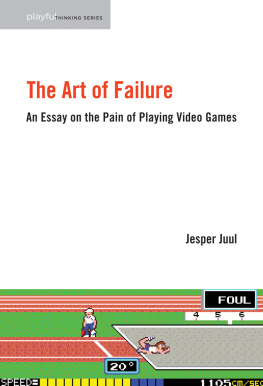
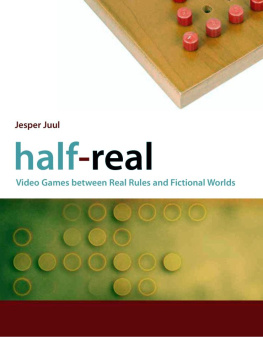
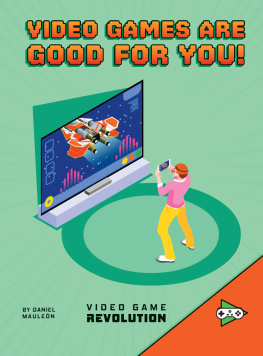
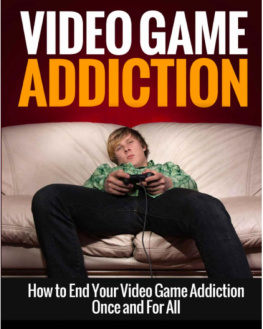
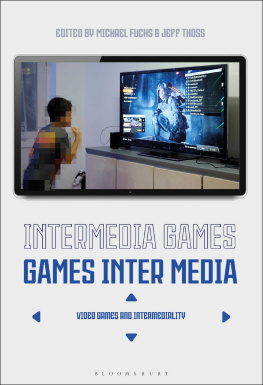
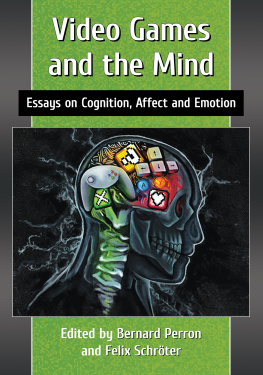

![Mark J. P. Wolf (editor) - Encyclopedia of Video Games: The Culture, Technology, and Art of Gaming [3 volumes]](/uploads/posts/book/279290/thumbs/mark-j-p-wolf-editor-encyclopedia-of-video.jpg)

